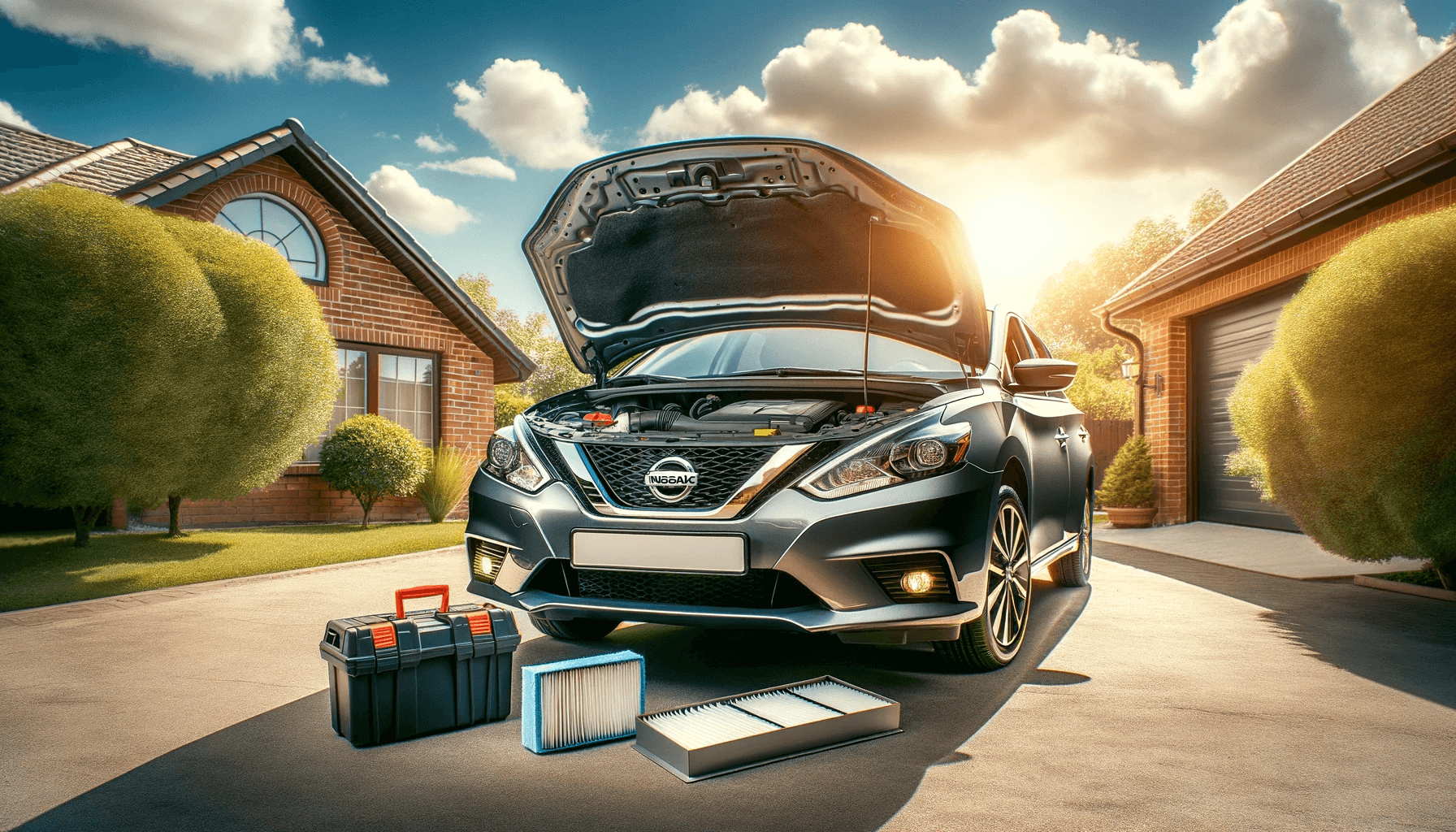Hey there, neighbor! If you’re wondering about which cabin air filter brands are best for your Nissan Sentra, I’ve got some tips for you. First off, brands like Fram, Bosch, and K&N are pretty popular among car enthusiasts. Fram’s filters are great at trapping dirt and dust, so you’re getting cleaner air inside your car. Bosch filters are known for their durability, which is a big plus if you drive a lot. And K&N? They make washable filters, so you can reuse them instead of buying new ones all the time.
But here’s the thing – no matter what brand you go for, make sure it fits your specific Sentra model. Not all filters are created equal, and using the wrong size or type can mess things up. It’s like wearing shoes that are too small; just doesn’t work right. Also, consider what you need most. Some filters are better for people with allergies since they’re really good at catching pollen and other allergens.
In the end, it’s about balancing cost, quality, and what you need your filter to do. If you’re still unsure, maybe check out some online forums or ask a mechanic you trust. They can usually point you in the right direction based on your car’s model and year.
Changing your car’s cabin air filter regularly might seem like a small thing, but it actually does quite a bit for the environment. Think of it this way: a clean filter means your car’s air system doesn’t have to work as hard. When the system’s working smoothly, your car uses less fuel. Less fuel means fewer emissions, and that’s good news for the planet.
Contents
- 1 Can a clogged cabin air filter lead to other issues in the Nissan Sentra?
- 2 How does the cabin air filter impact the HVAC system in a Sentra?
- 3 Can Changing the Cabin Air Filter Help with Allergy Problems While Driving?
- 4 Step-by-step guide to replace the cabin air filter in a Nissan Sentra?
- 5 What tools are needed to replace the cabin air filter in a Nissan Sentra?
- 6 Step-by-Step Guide to Replace the Cabin Air Filter in a Nissan Sentra
- 7 How Can I Tell if a Cabin Air Filter is High-Quality for My Nissan Sentra?
- 8 How to troubleshoot airflow problems after replacing Sentra’s air filter?
- 9 What Specific Models of Cabin Air Filters are Best for Older vs. Newer Nissan Sentra Models?
- 10 What Are the Legal Aspects of Disposing of Car Filters, Considering Environmental Regulations?
- 11 What Are the Health Risks Associated With Not Changing the Cabin Air Filter, Especially for People With Respiratory Issues?
Can a clogged cabin air filter lead to other issues in the Nissan Sentra?
But there’s more to it. When your filter’s clogged, your car’s HVAC system can get strained. This strain means the system uses more energy, and that’s not great for your fuel economy. So, by keeping your filter clean, you’re helping to reduce your car’s carbon footprint. Every little bit helps when it comes to protecting our environment.

Lastly, a well-maintained car is likely to last longer, which means fewer cars on the road and less manufacturing pollution. It’s like taking care of anything else in life; the better you maintain it, the longer it lasts, and the less waste we create.
Absolutely, a clogged cabin air filter can cause a few headaches with your Nissan Sentra. First off, it can make your car’s HVAC system work harder than it should. When that happens, you might notice your car’s not heating up or cooling down as quickly as it used to. It’s like trying to breathe through a straw; not much air gets through, right?
Also, if your filter is really dirty, it can start affecting the air quality inside your car. You might start noticing more dust or even a musty smell. That’s not great, especially if you have allergies or asthma. Clean air inside your car is important for your comfort and health.
How does the cabin air filter impact the HVAC system in a Sentra?
And let’s not forget about the impact on fuel efficiency. While it’s not a huge difference, a struggling HVAC system can lead to slightly higher fuel consumption. It’s like running with a heavy backpack; you’re going to use more energy. So, keeping that filter clean helps your car run more efficiently.
Getting rid of your old cabin air filter without hurting the environment is easier than you might think. Most filters are made of paper and plastic, which can often be recycled. Just make sure to take off any parts that can’t be recycled, like rubber edges or foam pieces. Your local recycling center can give you the specifics on how they handle these materials.
But hey, if you’re feeling creative, you might find other uses for that old filter. Some DIY enthusiasts use them in their workshops for extra dust filtration. It’s not the most common solution, but it’s a neat way to give that old filter a second life.
If you can’t recycle or repurpose the filter, your next best bet is to make sure it’s disposed of in a way that’s least harmful to the environment. Some filters might have materials that are considered hazardous, so dropping them off at a facility that handles hazardous waste is a smart move. The key is to avoid just tossing it in the trash where it’ll end up in a landfill.
When you’re swapping out the cabin air filter in a newer Nissan Sentra, it’s normal to wonder about the warranty. Generally speaking, changing your cabin air filter is just regular maintenance, so it shouldn’t mess with your warranty. There’s this thing called the Magnuson-Moss Warranty Act that protects you. It lets you do routine maintenance without losing your warranty coverage.
But here’s the catch – you’ve got to use the right type of filter. Nissan usually has specific recommendations for each model. If you go off-script and use a filter that’s not up to par, and something goes wrong, the warranty might not cover it. So, it’s a good idea to keep all your receipts and records of the work done, just in case.
If you’re still under warranty and a bit worried about it, you can always have the filter changed at a Nissan dealership. Sure, it might cost a bit more, but then you’re playing it super safe. They’ll use parts that are up to Nissan’s standards, so your warranty stays intact.
Can Changing the Cabin Air Filter Help with Allergy Problems While Driving?
Definitely! If you’re dealing with allergies, changing the cabin air filter in your Sentra can be a game changer. A fresh filter does a way better job at trapping all those pesky allergens like pollen, dust, and other tiny particles that float around in the air. This means when you’re driving, you’re breathing in cleaner air, which can really help reduce those annoying allergy symptoms.
Think of the cabin air filter as a superhero that guards your car’s interior against invisible enemies. When it’s old or clogged, it can’t fight off these allergens as effectively, letting them sneak into your car. For anyone with allergies, that’s not great news. A new filter keeps the air inside your car much cleaner, so you can breathe easier and focus on the road instead of your sneezes.
The difference between a new and an old cabin filter is like night and day, especially when it comes to air quality inside your car. A new filter is clean and unobstructed, so it can catch a ton of airborne stuff you don’t want to breathe, like dust, dirt, and even bacteria. This means the air inside your Sentra stays much cleaner and fresher.
On the flip side, an old filter gets clogged with all the stuff it’s been catching. Once it’s full, it can’t trap any more particles. This means more dust and dirt can get into your car, making the air inside feel stale and even a bit smelly. Plus, it can be a real hassle for people with respiratory issues or allergies, as it allows more irritants and allergens to circulate in the air.

Your Sentra’s HVAC system, which controls heating, ventilation, and air conditioning, relies heavily on the cabin air filter to function properly. When the filter is clean, air flows freely, allowing the system to work efficiently. This means you get consistent air temperature and flow, whether it’s heat in the winter or AC in the summer.
However, when the filter gets clogged, the HVAC system has to work harder to push air through. This extra strain can lead to a few problems: reduced efficiency, more wear and tear on the system, and even higher fuel consumption since your car’s working overtime. Plus, if the system can’t pull in enough air, it can’t regulate the cabin temperature as well, so you might notice it’s not as cozy in the winter or cool in the summer.
Step-by-step guide to replace the cabin air filter in a Nissan Sentra?
Cleaning and reusing a cabin air filter in your Sentra really depends on the type of filter it is. Most cabin air filters are made to be disposable and are best replaced when they’re dirty. Trying to clean them can be tricky since they’re made of materials like paper and fabric that don’t take well to washing.
However, there are some reusable filters out there, like those from K&N, which are designed to be cleaned and reused. If you’ve got one of these, then yes, you can clean it according to the manufacturer’s instructions and pop it back in. But for regular filters, it’s usually best to just replace them. It saves time and ensures your air stays clean without the hassle of trying to clean a filter that’s not made for it.
In winter, there are a few signs that it might be time to change your cabin air filter. First up, if your car’s interior windows start fogging up more than usual, that could be a sign. A clogged filter can mess with the moisture levels in your car, leading to extra foggy windows.
Another thing to watch for is a decrease in airflow from your car’s vents. If it feels like your heater’s just not blowing as much air as it used to, a dirty filter could be to blame. And if you notice a musty or mildewy smell when you crank up the heat, that’s another red flag. It means the filter might be full of gunk and needs a change.

So, keep an eye (and a nose) out for these signs. A fresh filter can make your winter drives more comfortable and clear up those windows faster. Plus, it’s always nice to get into a warm, fresh-smelling car on those cold mornings, right?
You know, for your Nissan Sentra, it’s a good idea to swap out the cabin air filter about every 15,000 to 30,000 miles. But hey, this can vary. If you’re often driving in places with lots of dust, pollen, or pollution, or if you notice your allergies acting up more when you’re driving, you might want to change it more often. The thing is, a clean filter means cleaner air inside your car, so it’s worth keeping an eye on.
Alright, so in most Nissan Sentra models, you’ll find the cabin air filter behind the glove box. What you’ll usually do is open the glove box, and in some models, you might have to remove it to get to the filter. It’s typically in a rectangular slot. The exact spot can change a bit depending on your Sentra’s year and model, so it’s always smart to peek at your owner’s manual for the specifics.
What tools are needed to replace the cabin air filter in a Nissan Sentra?
Good news – this is a pretty simple task. You might just need a screwdriver to help you remove the glove box and get to the filter compartment. After that, it’s usually just a matter of taking out the old filter and putting in the new one. No complicated tools or mechanics’ know-how needed. It’s a pretty straightforward DIY job.
Totally! Changing the cabin air filter is a great DIY task that you can do right at home. It’s usually as simple as removing the glove box, pulling out the old filter, and sliding in a new one. No need to be a car expert or have a bunch of tools. It’s a quick and easy way to make sure you’re breathing clean air in your car, and you’ll feel pretty handy doing it!
There are a few signs to watch for. If you start noticing a musty or stale smell in your car, that’s a big hint. Another giveaway is if the airflow from your vents seems weaker than usual. And if your car’s interior starts getting dustier, or if your allergies seem worse when you’re driving, those could also be signs your filter is getting full. When you see these things happening, it’s probably time for a new filter.
So, keeping up with your cabin air filter is a small but important part of taking care of your Nissan Sentra. It’s all about making sure the air in your car is as clean as it can be. If you have any other questions, feel free to ask!
Replacing the cabin air filter in your Sentra is a quick job. For most folks, it takes about 15 to 20 minutes, maybe a little longer if you’re doing it for the first time. It’s mostly about removing the glove box to get to the filter, swapping out the old one for the new, and then putting everything back together. It’s a great DIY task that doesn’t eat up your afternoon.
Changing your cabin air filter has some pretty neat benefits. First, it improves the air quality inside your car. A new filter is better at trapping dust, pollen, and other airborne nasties, so you’re breathing cleaner air. This is especially good news for anyone with allergies or asthma.
Another benefit is that a clean filter helps your HVAC system work more efficiently. This means better heating and cooling in your car, and who doesn’t want that? Plus, it can prevent unwanted odors and keep your car’s interior feeling fresh.
Yep, there are a few different types of cabin air filters you can choose for your Sentra. The most common are the basic particulate filters, which are great for trapping dust and larger particles. Then you’ve got the activated carbon filters. These are a step up because they can also help eliminate odors and gases, making your ride even more pleasant.
The cost can vary depending on where you get the filter and what type you choose. Generally, you’re looking at around $15 to $25 for a standard filter. If you go for a fancier one, like those with activated carbon, it might be a bit more. Of course, if you get it changed at a dealership or a mechanic, they’ll probably charge for labor too. But if you do it yourself, you’ll just be paying for the filter.
Getting the right fit is crucial. First, check your Sentra’s manual or look up the filter specifications online to make sure you’re buying the right size and type. When installing, make sure the filter fits snugly in the housing and that the air flow arrow on the filter matches the direction indicated in your car. It’s like putting a puzzle piece in the right spot – it should fit perfectly without forcing it.
You bet it can. While a dirty cabin air filter might not directly affect your Sentra’s horsepower or acceleration, it can mess with other important aspects. First off, it can strain your HVAC system. If your filter is clogged, your car’s heating and cooling have to work harder, which can lead to more wear and tear over time. Plus, your car might take longer to warm up or cool down, which isn’t fun in extreme weather.
Then there’s the air quality inside your car. A dirty filter means more dust, pollen, and other junk circulating in your cabin. Not great, especially if you have allergies or asthma. Plus, it can lead to some funky smells, and nobody wants a stinky car.
And while it’s not a huge impact, a clogged filter can slightly affect your fuel efficiency. The harder your HVAC system has to work, the more energy your car uses. It’s not going to empty your tank rapidly, but it’s something to keep in mind.
Step-by-Step Guide to Replace the Cabin Air Filter in a Nissan Sentra
Replacing your Sentra’s cabin air filter is a piece of cake. Here’s how to do it:
- Open Your Glove Box: Start by emptying out your glove box. There’s usually a lot of stuff in there, so find a spot to put it temporarily.
- Remove the Glove Box: Most Sentras have a couple of stops or tabs at the back of the glove box. Gently push these in, and the glove box should drop down or come out completely, exposing the area behind it.
- Access the Filter: You’ll see a rectangular compartment, which is where the filter lives. Open it up – sometimes there’s a clip or a latch you’ll need to release.
- Swap the Filter: Pull out the old filter, noting which way the airflow arrow is pointing. Pop in your new filter the same way. Make sure it’s snug but don’t force it.
- Put Everything Back: Close up the filter compartment and reattach your glove box. Don’t forget to put all your stuff back in!
Nope, there’s no reset needed after changing your cabin air filter. It’s one of those straightforward maintenance tasks. Once you’ve got the new filter in and everything’s back in place, you’re good to go. Just enjoy the fresh air!
So, OEM (Original Equipment Manufacturer) filters are made by Nissan specifically for your Sentra. They’re guaranteed to fit perfectly and meet the specs your car needs. Aftermarket filters, made by other companies, often come at a lower price and can offer more variety, like filters with activated carbon for odor control.
The main thing is to choose a quality aftermarket filter if you go that route. They can work just as well as OEM ones, but since they’re not made by Nissan, it’s important to pick a reputable brand. This ensures you get a filter that fits right and does the job well.
How Can I Tell if a Cabin Air Filter is High-Quality for My Nissan Sentra?
A high-quality cabin air filter should have a few key features. First, check the material. It should be sturdy and well-constructed, not flimsy or easily torn. If it has multiple layers, even better – that means more filtration.
Next, look at the fit. A good filter should fit perfectly in your Sentra’s filter compartment. If it’s too loose or too tight, it won’t work as efficiently. And if it has special features like activated carbon for odor control, that’s a bonus, especially if you’re dealing with city pollution or just want to keep your car smelling fresh.
So, when you’re swapping out the cabin air filter in your Sentra, a couple of things can trip you up if you’re not careful. The most common issue is not getting the right filter size. A filter that’s too big or small just won’t fit right, and that can mess up the whole thing. Another thing to watch out for is making sure you put the new filter in the right way. There’s usually an arrow that shows the airflow direction – it’s important to get that right, or you might not get the full benefit of the new filter. And lastly, be gentle with the glove box and other plastic parts. They can be a bit flimsy and you don’t want to break anything.
Now, about improving your gas mileage by changing the cabin air filter… Well, it’s not going to make a huge difference, but it can help a bit. A clean filter means your HVAC system doesn’t have to work as hard. When it’s working smoothly, your car’s engine isn’t under unnecessary strain, which can, in a small way, improve your overall fuel efficiency. Think of it like this: it’s not a magic bullet for saving gas, but it’s part of keeping your car running efficiently.
If you don’t change that cabin air filter, a few things can go south. Firstly, the air quality in your car can get pretty bad. A dirty filter means more dust, pollen, and other irritants hanging around inside your car. If you’ve got allergies or asthma, that’s not good news. Also, a clogged filter puts extra strain on your HVAC system, which can lead to wear and tear over time. Plus, it can cause your windows to fog up more, which is definitely not great for driving safely.
How to troubleshoot airflow problems after replacing Sentra’s air filter?
Ran into some airflow issues after changing the filter? First thing, check if you’ve installed the new filter correctly. It’s got to be the right size and fitted snugly in its place. If it’s backward, that can mess up the airflow. Also, take a look around the vents and the filter compartment for any blockages. Sometimes leaves or other debris can get stuck in there. If everything looks good but you’re still having problems, it might be something else in your HVAC system. In that case, it might be time to check in with a mechanic.
Absolutely, you can upgrade your cabin air filter for better allergen filtering. There are filters out there that are specifically designed to trap more allergens, like pollen and mold spores. These are great if you suffer from allergies or just want cleaner air in your car. When you’re shopping for a new filter, look for terms like “HEPA,” “allergen,” or “premium filtration.” These filters can capture much finer particles than standard ones, making a big difference in air quality. Just make sure whatever you choose is compatible with your Sentra.
What Specific Models of Cabin Air Filters are Best for Older vs. Newer Nissan Sentra Models?
For older Sentra models, you’ll want to look for filters that fit perfectly. These models often do well with standard, no-frills filters. Brands like Fram or Bosch offer a range of options. Just check the model year against the filter’s compatibility list.
Now, for newer Sentras, you might consider more advanced filters, like those with activated carbon. These newer models can benefit from this extra layer of filtration, especially if you’re driving in urban areas with more pollution. High-efficiency filters, like HEPA filters, are also a great choice for newer models.
Always double-check the specifications for your specific Sentra model. A right fit is crucial for effective filtration, regardless of the model year.
The quality of your cabin air filter can have a subtle impact on fuel efficiency. A clogged or low-quality filter makes the HVAC system work harder. When your HVAC system strains, it can put a slight additional load on the engine.
A high-quality filter keeps the air flowing smoothly. This means the HVAC system doesn’t need to overwork, which can help maintain better fuel efficiency. It’s not going to drastically change your gas mileage, but every little bit helps.
In short, a good filter supports overall vehicle efficiency. While it’s a small factor compared to others like driving habits, it contributes to the smooth running of your car.
Interestingly, a better cabin air filter can contribute to a quieter ride. A high-quality filter can more effectively block some of the external noise. This includes sounds like traffic and wind, especially in busy areas.
Filters with multiple layers or special materials are better at sound insulation. While it won’t eliminate noise completely, it can make the interior of your Sentra a bit more peaceful.
Remember, though, the primary job of these filters is to clean the air, not soundproof your car. But it’s a nice added benefit you might notice.
Not changing the cabin air filter can have a few environmental impacts. First, a dirty filter can lead to reduced HVAC efficiency. This can slightly increase fuel consumption and, as a result, emissions.
Additionally, when your filter is clogged, your car’s engine can experience increased stress. Over time, this can contribute to more emissions and potentially even engine damage.
In essence, a clean filter supports better vehicle health. And a healthier vehicle tends to be more environmentally friendly in its operation.
Replacing your cabin air filter ties into overall vehicle emissions more than you might think. A clean filter helps the HVAC system operate efficiently. When your HVAC isn’t overworking, it reduces the strain on your engine.
Less strain on the engine can translate to more efficient fuel use. More efficient fuel use means you’re getting the most out of every gallon, which can help keep emissions down.
In a roundabout way, regular maintenance, like changing your cabin air filter, contributes to the overall health of your vehicle. And a well-maintained vehicle tends to be more eco-friendly.
When you’re changing the cabin air filter in your car, there’s not a huge risk of damaging other parts, but you do need to be careful. The most common area you need to watch out for is the glove box and its components. In most cars, including a Sentra, you need to open or sometimes remove the glove box to get to the air filter. Just be gentle and patient with it. The clips and hinges on the glove box can be a bit delicate, so handle them with care. As long as you follow the proper steps and don’t force anything, you should be fine.
What Are the Legal Aspects of Disposing of Car Filters, Considering Environmental Regulations?
When it comes to disposing of old car filters, like your cabin air filter, it’s important to do it responsibly. Depending on where you live, there might be specific environmental regulations about how to dispose of them. Most of these filters are made from paper and plastic, which can often be recycled. However, make sure you’re not just throwing them in your regular trash. Some areas have special facilities for automotive parts recycling. It’s always a good idea to check with your local waste management services for the right disposal methods to keep things eco-friendly.
Generally, changing the cabin air filter yourself shouldn’t void your car’s warranty. It’s considered routine maintenance, much like changing your oil or replacing wiper blades. The key here is to make sure you use the right filter for your model and install it correctly. However, if you’re still under a specific warranty that requires all maintenance to be done by a professional, you might want to double-check the terms. When in doubt, a quick call to your dealership can clear things up and keep your warranty intact.
What Are the Health Risks Associated With Not Changing the Cabin Air Filter, Especially for People With Respiratory Issues?
Not changing your cabin air filter can lead to a few health concerns, particularly if you or your passengers have respiratory issues like asthma or allergies. A dirty filter can’t trap pollutants and allergens effectively, which means things like pollen, dust, and car exhaust can get into your car’s cabin. This can worsen allergy symptoms and respiratory problems. Also, a clogged filter can lead to poor air circulation, which might cause the air inside your car to become stale and potentially aggravate breathing issues.
Definitely! In winter, having a clean cabin air filter can really make a difference in your driving experience. A new filter can help your car’s heating system work more efficiently. When the filter is clogged, it can restrict airflow, making it harder for your car to warm up and defrost the windows. Plus, in winter, we tend to keep our windows closed, so having a clean filter is key to maintaining good air quality inside your car. A fresh filter can also help to prevent the musty odors that often come with damp winter weather.












Dear friends! If you have any questions, write here in the comments. I will be happy to answer your questions.